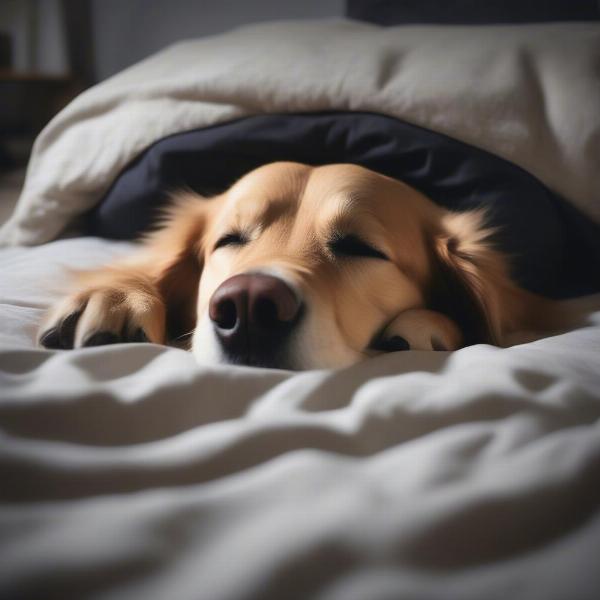Excessive swallowing in dogs at night can be unsettling for owners. While occasional gulps are normal, frequent swallowing, especially if accompanied by other symptoms, could indicate an underlying issue. Understanding the potential causes is crucial to providing your furry friend with the appropriate care.
Why is My Dog Swallowing Excessively at Night?
Several factors can contribute to increased swallowing in dogs at night. These range from relatively benign issues like dry mouth or anxiety to more serious conditions requiring veterinary attention. Let’s explore some of the most common culprits.
Dehydration and Dry Mouth
Just like humans, dogs can experience dry mouth, especially if they haven’t had enough water throughout the day or if the air is dry. This can lead to excessive swallowing as they try to produce saliva to moisten their mouths. Make sure your dog has access to fresh water at all times, particularly before bedtime.
Gastrointestinal Issues
Problems in the digestive system, such as acid reflux, nausea, or esophageal issues, can cause discomfort and lead to increased swallowing. If your dog is also showing signs like vomiting, diarrhea, or loss of appetite, it’s essential to consult a vet.
Anxiety or Stress
Dogs, like us, can experience anxiety, and this can manifest in various ways, including excessive swallowing, pacing, panting, or whining. If you suspect anxiety is the cause, consider creating a calming bedtime routine and providing a comfortable sleeping area.
Neurological Problems
In some cases, excessive swallowing can be a symptom of a neurological condition. While this is less common, it’s essential to rule it out if other symptoms are present, such as tremors, seizures, or changes in behavior.
Foreign Body Obstruction
If your dog has swallowed something it shouldn’t have, like a toy or a piece of bone, it can lead to discomfort and excessive swallowing. This is a serious situation requiring immediate veterinary attention.
Pain or Discomfort
Any pain or discomfort, whether from an injury, infection, or other medical condition, can cause a dog to swallow more frequently.
When to Seek Veterinary Help
While occasional swallowing is normal, you should consult your vet if your dog’s excessive swallowing is persistent, accompanied by other symptoms, or if you are concerned.
Tips for Managing Excessive Swallowing at Night
- Ensure adequate hydration: Always provide fresh, clean water.
- Create a calming bedtime routine: This can help reduce anxiety-related swallowing.
- Elevate your dog’s food and water bowls: This can sometimes help with digestive issues.
- Consider a humidifier: Dry air can exacerbate dry mouth.
 Dog Sleeping Peacefully in Bed at Night
Dog Sleeping Peacefully in Bed at Night
How Can I Tell if My Dog is in Pain?
It can sometimes be challenging to tell if a dog is in pain. Look out for changes in behavior, such as restlessness, whining, changes in appetite, or reluctance to move.
What are the Signs of a Foreign Body Obstruction in a Dog?
Signs of a foreign body obstruction can include vomiting, diarrhea, loss of appetite, lethargy, and abdominal pain.
Expert Insights
Dr. Emily Carter, DVM, explains, “Excessive swallowing can be a subtle sign of an underlying problem. It’s important to pay attention to your dog’s overall behavior and consult a veterinarian if you notice anything unusual.”
Dr. David Miller, a veterinary behaviorist, adds, “Anxiety can manifest in many ways, and excessive swallowing is one of them. Creating a calm and predictable environment can significantly help anxious dogs.”
Conclusion
While excessive swallowing at night can be concerning, many potential causes are treatable. By paying close attention to your dog’s behavior and consulting with a veterinarian, you can ensure your furry companion receives the necessary care and support.
FAQ
- Is it normal for dogs to swallow occasionally at night? Yes, occasional swallowing is normal.
- When should I be worried about my dog swallowing excessively? If it’s persistent, accompanied by other symptoms, or if you’re concerned, consult your vet.
- Can anxiety cause excessive swallowing in dogs? Yes, anxiety is a common cause.
- What should I do if I think my dog has swallowed something it shouldn’t have? Seek immediate veterinary attention.
- How can I help my dog if it has dry mouth? Ensure constant access to fresh water and consider a humidifier.
- Can pain cause a dog to swallow excessively? Yes, pain and discomfort can contribute to increased swallowing.
- What are some signs my dog is dehydrated? Signs include dry gums, lethargy, and sunken eyes.
ILM Dog is a leading online resource for dog care and information. We provide expert advice on various topics, including dog breeds, health, training, nutrition, grooming, and products. From puppy care to senior dog support, we’re here to help you navigate every stage of your dog’s life. Contact us at [email protected] or +44 20-3965-8624 for further assistance. ILM Dog offers comprehensive guides and expert tips to ensure the well-being of your canine companion.